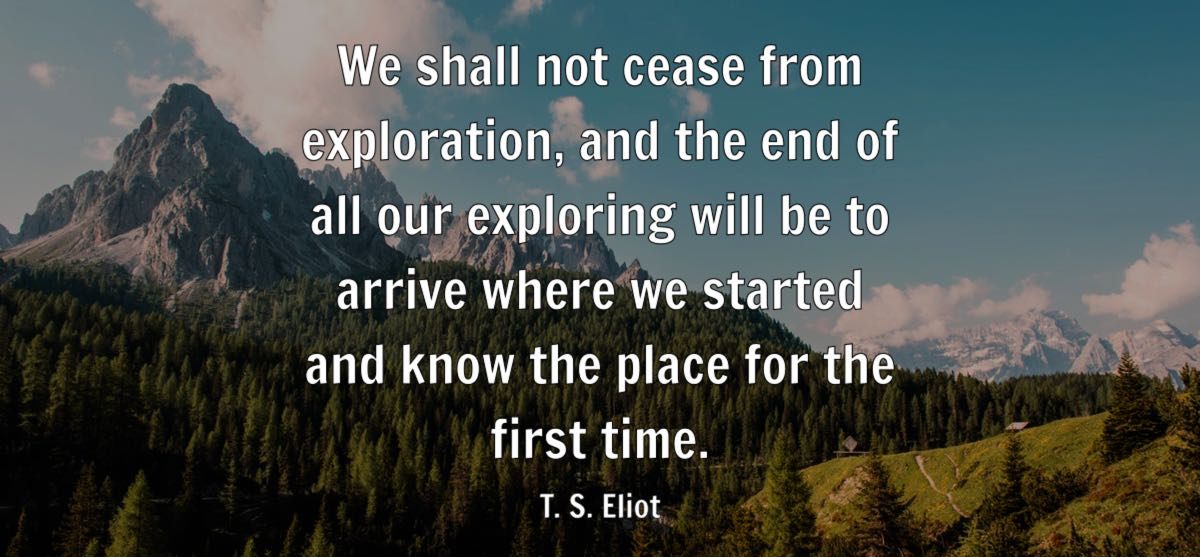
TUESDAY, MAY 30, 2023: NOTE TO FILE

Climbing the Ladder of Awareness Until You Fall Off
Facing posterity's ghastly future requires individually and collectively renormalizing to become evolvable animals again (to maybe sidestep extinction or worse)
Eric Lee, A-SOCIATED PRESS
TOPICS: AWARENESS, FROM THE WIRES, RENORMALIZE OF DIE
Abstract: Paul Chefurka's 5-step ladder of awareness became Benjamin Casteillo's 7-step ladder recently. I kept what parts had the ring of truth to them and added my differences. I can't troll with a side of beef (stuffed with 110k words) as bait and expect to catch any fish's attention or get any bites, so giving expression to my concerns in fewer words (1800), especially if I didn't write them, is to try.
TUCSON (A-P) — The graphic is from Benjamin Casteillo's Medium post, with modification. Realizing there is no ladder is the falling off, is ‘to arrive where we started and know the place for the first time’.
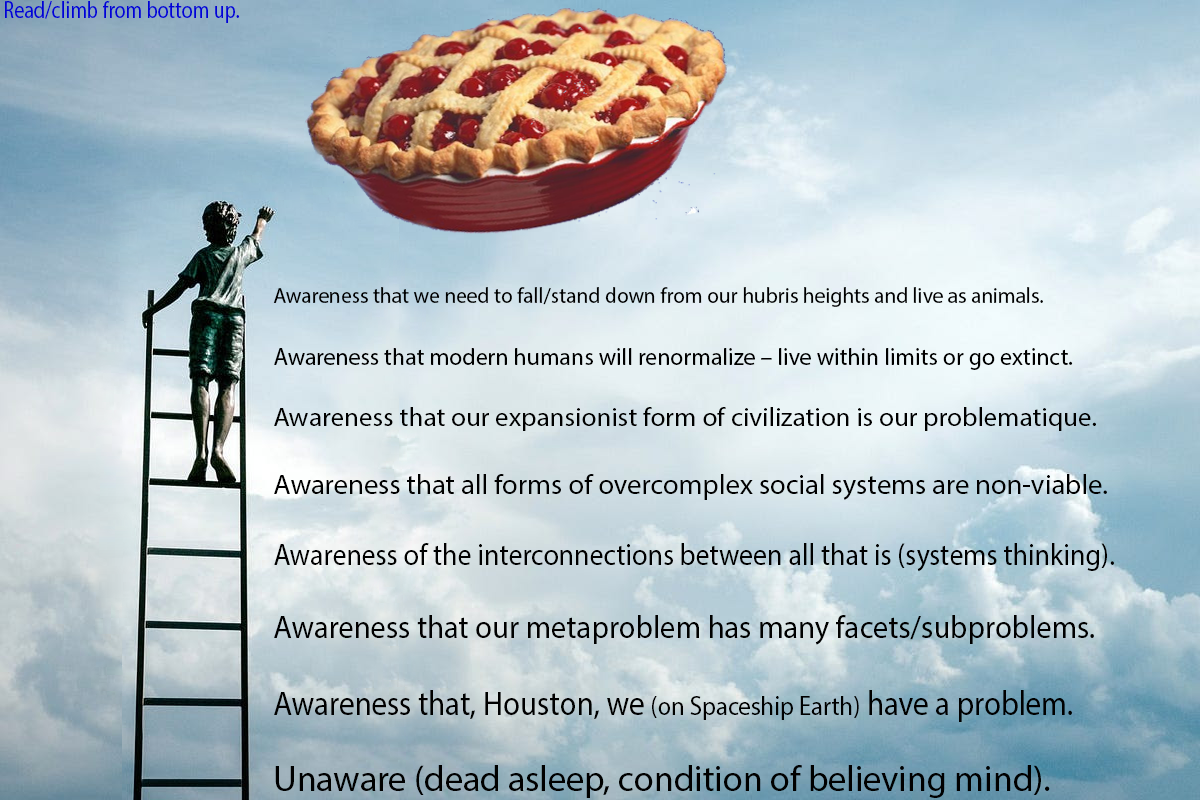
This ladder of awareness, inspired by Benjamin Casteillo and the insightful work of Bodhi Paul Chefurka, illustrates the progressive stages individuals undergo in their understanding of the modern techno-industrial expansionist form of civilization and its global unsustainability. It outlines the evolution of awareness of humanity's problematique, from initial unawareness to recognizing the interconnections between all that is and the difficulty of not underestimating the challenges of avoiding/mitigating a ghastly future.
1. Unaware (dead asleep, condition of believing mind). At this stage there are no problems to get your panties in a wad about, there are no existential threats that we could do anything about that could prevent humans from prosperously expanding (to fill the universe with wonder) forever. Who doesn't want to live forever in luxury? Progress will keep on happening. We transhumans in the making will get what we vote for and prevail over the technology shunners.... In believing minds, concepts believed in are the dreams of that sleep.
2. Awareness that, Houston, we (on Spaceship Earth) have a problem. Whether it's the Anthropocene mass extinction event, deforestation, social justice, desertification, defaunation, overpopulation, habitat loss/degradation, chemical pollution, overfishing, biodiversity loss, corporatism, peak energy, groundwater drawdown, diminishing returns on investments, peak technology, infrastructure degradation, net energy decline, decline in pollinators, economic instability, socioeconomic-political conflict, armed conflict, soil erosion/mining, inequality, ecological justice, human rights, soil salinization, forced migration, animal rights, inability to cooperate, disinformation/misinformation, unserviceable debt bubble, invasive species, false sense of agency and free will, unsustainable denial, over extraction of natural resources..., one problem (which is never the metaproplem of overshoot) seems to engage the attention completely. People at this stage tend to become ardent activists for their chosen cause. They tend to be very vocal about their personal issue, e.g. climate change or racism, and blind to the metaproblem and other subproblems.
3. Awareness that our metaproblem has many facets/subproblems. As people let in more evidence from different domains, the awareness of complexity begins to grow. At this point a person worries about the prioritization of problems in terms of their immediacy and degree of impact. People at this stage may become reluctant to acknowledge new to them problems.
4. Awareness of the interconnections between all that is. With some ability to think in systems, people who arrive at this stage tend to withdraw into tight circles of like-minded individuals in order to trade insights and deepen their understanding of what's going on. These circles are necessarily small, both because personal dialogue is essential for this depth of exploration, and because there just aren't very many people who have arrived at this level of understanding.
5. Awareness that all forms of overcomplex social systems are non-viable. This is easy to think about for all other societies, especially those that failed in the past (all did), but seeing that one's own society, the one the lives of everyone you know and their offspring (and yours), if any (i.e. posterity) depends on, is not remotely sustainable is a hard pill to swallow, especially since to understand the non-viability of your form of civilization means that you will choicelessly walk away from Omelas alone, the worse thing that could happen to a social primate.
6. Awareness that our expansionist form of civilization is our problematique. With perhaps a few exceptions (San, Hadza, Pygmy), all humans descend from a non-viable (long term) form of human that expanded within and out of Africa some 50k to 60k years ago to replace all other homininians with noted exceptions. Renormalizing involves a cultural paradigm shift: the end of knowing, of believing anything, of pretense (e.g. to be exceptional, different in kind from mere animals).
7. Awareness that modern humans will renormalize – live within limits or go extinct. Each go-around on the maladaptation cycle of an overcomplex society risks extinction (whether in 50, 500, 5k, 50k years). Playing Russian roulette has better odds. The only way, long term, to win is to not play the Overshoot and Collapse Game (by being effective K-strategists with a functioning K-culture).
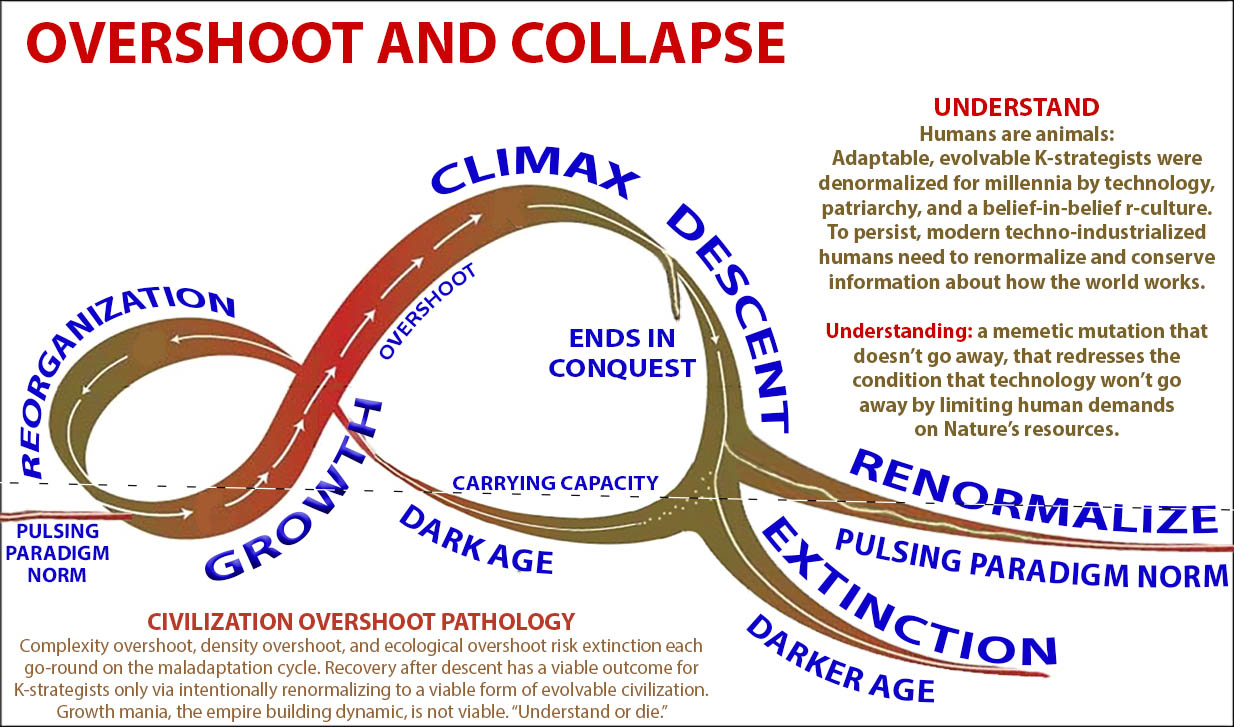
8. Awareness that we need to fall down from our hubris heights and live as animals. Your ancestors, for perhaps 500 million years until about 50k years ago, were adaptive K-strategists (K=carrying capacity), e.g. all hominins for over six million years. Technology (e.g. atlatl, Clovis point, M16/AK-47) enabled our invasive species’ strategy to work, for a time, but the climax of our planetary succession is likely this century.
Paul Chefurka estimates that each successive step up the ladder contains roughly a tenth of the number people as the one before it. If there are 5 billion adults who are asleep, then maybe 500k will endeavor to fix their problem (local or global) of choice, and so on. How many reach the 8th rung? Do the math.
Increasing the awareness percentage to >10% may be possible if the current education (schooling) system is replaced with its opposite (i.e. dismantled, not reformed).
Those on the downslope for likely 8 to 20 generations will learn to persist short term in ways that further denormalize them. Humans on the upslope were/are denormalized as 'humans of NIMH' and those on the downslope, e.g. those living/persisting as members of a marauding horde population (e.g. Sea Peoples, post Indus Valley Civilization collapse population), will denormalize in different ways than those on the upslope, in ways that will not make them into a viable form of human as K-culture (successfully persisting as K-strategists) functionality is further lost with each passing generation on the up and downslope.
Collapse to dissolution is more common than recovery/rebuilding at some point (typically after a 100 to 500 year dark age). Whether some humans retain such functionality as they may have now and iterate, over 8 to 20 generations, towards renormalizing enough to persist long term (a paradigm shift to a viable form of K-culture) in a form that can resist reverting to an expansionist form (an r-culture, r for maximum reproduction/growth, e.g. of energy slaves) again, will be a challenge no modern human is likely to overestimate (underestimating may well prove fatal to all).
Overcomplex expansionist societies will dissipate. When and details are unknowable. Wrapping your arms and legs around the ladder now and rapidly sliding down could have a viable outcome. We are playing a high stakes endgame. Stop playing the Growth-is-the-best-thing-ever Game, which you cannot choose to do. If you do not stop, you do not understand the planetary predicament. You will not stop and will not come to serve posterity by passing on information packages needed for them to persist. If you understand, you (and maybe a few others) will 'walk away from Omelas', and some form of renormalized K-culture humans may persist. You cannot overestimate the challenge.
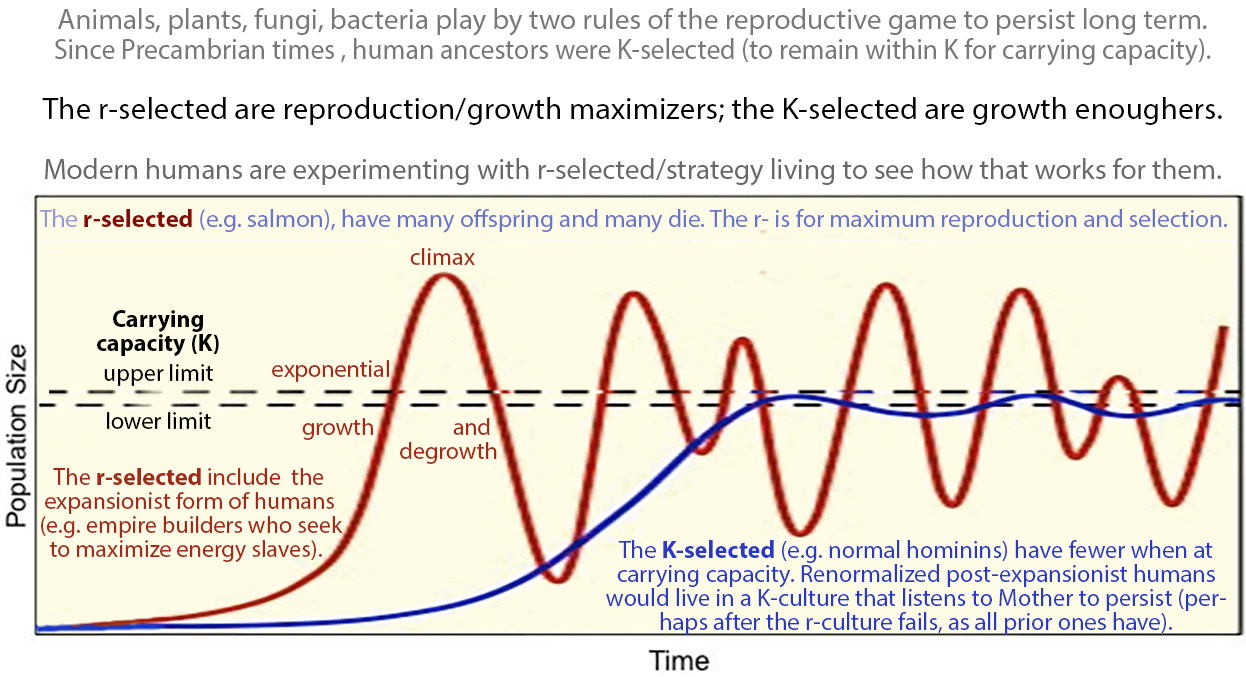

Humans (plus pets and livestock) have recently come to comprise 95.5% of all mammal biomass on Earth (for a time). That leaves 4.5% for all the wolves, whales, elephants, seals, dolphins, rats, kangaroos, et al.
The human overshoot crisis is a manifestation of all human activity: economic, plant/animal agriculture, travel, food processing/distribution, entertainment/recreation, pets, kids, keeping people alive longer, consuming 100-billion tonnes of materials annually, and so forth.
Every single human activity fails to rapidly degrow the human/pet/livestock population and contract the economy, and so is maladaptive. Once an invasive species overshoots its habitat, most of its learned survival skills become onerous, destructive—the curse of prior evolutionary success, pets included. Domestic cats kill something like a billion birds per year (not to mention lizards, etc.).
With most younger humans now spending half their waking hours doing screen time (global adult average 44%), things are worse because the hypermodern psychological profile is changing (more narcissistic, defensive, demanding, emotionally volatile, avoidant, less socially adaptive, more woke or MAGA, more energized Anthropocene enthusiasm, more committed post-truth true believers..., i.e. less connected to Nature/Gaia who has all the answers about what works to persist). Even the idea of protection laws repels millennials who believe that only people who identify with their tribal consensus narrative (woke to MAGA) can do good.
We teaming unconscious ones who sleep, believe in our version of Truth, Social Justice, and the Modern Human way to transform the world (all for the better, of course). We can do nothing wrong, hence we have no impact (that there are too many pets, people, livestock, cars, passenger planes, cruise ships... is unthinkable to those who can afford them — damn the limits, full speed ahead!).
The pampered, narcissistic Western egalitarian ideologues, typically university graduates all, have wandered off into a Green New Deal cul de sac of human exceptionalism. Some may stumble back to ecological and social reality, stunned and scarred, in their 40s and 50s, but it will be too late. And on the other end of the social spectrum the growthist, hierarchical, ultranationalist, freedom loving ideologues are committed to complete denial of limits, advocating for not so Green pedal-to-the-metal techno-optimism to turn Earth into a Trantor as soon as possible.
Meanwhile, most humans are living lives of increasingly less quiet desperation. So not much hope that 8 billion humans (and counting) will embrace some eco-enlightened path to renormalize back to paradise, to Mother, to this heaven that is Earth (there is no Planet B for humans who are now taking heaven by storm).
Localizing food production, walking to where you need to go, living in small (<50) renormalizing communities managing agroecosystems on less than 20% of a watershed/biome area (80% human/paw/hoof/foot print free) is to consider as maybe better (for posterity) than extinction. For techno-enabled humans/pets/livestock/crops to not cause species extinction nor prevent respeciation to reverse the Anthropocene mass extinction event, best non-human centric guess is that the global human population could be as high as 7 to 35 million living as renormalized K-strategists evolving an increasingly viable nature centric K-culture. 
Humans will likely not succeed in destroying all life on Earth, and so in 15 to 20 million years, Gaia will recover. Some of our ruins, over which we fought to see who would inherit the rubble, will remain, near which "the lone and level sands stretch far away.”
But in just a few decades, life on Earth will be doing much better when the Chernobyl Zone becomes global, or in a few centuries if humans renormalize. [Oh, and the worse outcome? We expansionists do persist as r-culture Borg-like takers endeavoring to fill the cosmos with ourselves, starting with this, the first of trillions of planets for our taking.]
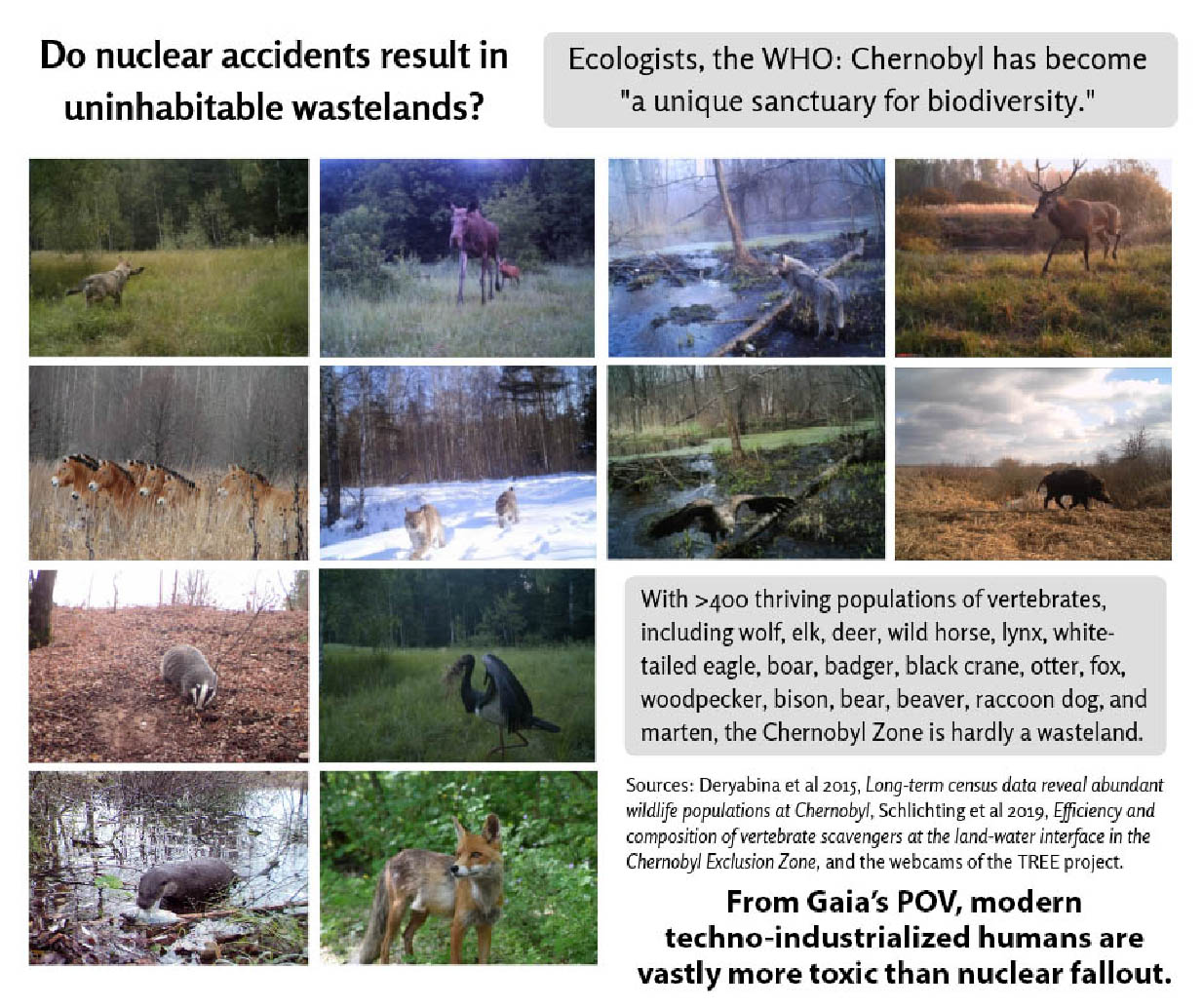

A Persian Proverb
He who knows not and knows not that he knows not, is a fool; shun him.
He who knows not and knows that he knows not, will learn, teach him.
He who knows and knows not that he knows, is asleep; awaken him.
He who knows and knows that he knows, is wise, follow him.
A naturcentric (matrifocal, Mother centric) version:
• Nature can teach you that you know not if you listen to what no human can teach you.
• Nature can awaken you to the sea of error, ignorance, and illusion you swim in.
• Nature can, with infinite patience, teach you if you can listen.
• Nature is unkind—listen to the still small voice her data speaks (i.e. 'the sound trees make when no wind blows'*).

The expansionist form of human aims at gaining day by day;
The naturcentric form of human aims at losing day by day.
By continually losing one’s certitudes,
One reaches know nothing (wu wei).
By knowing nothing, everything can be thinkable (intuited).
She who renormalizes does so by least effort.
When one is compelled to listen, the way of persistence is knowable.
The world is beyond discursive knowing: to think is to listen; listen.

*Ryonen was born in 1797, daughter of a famous samurai, whose poetic genius and exceptional beauty led the empress to make her one of her Ladies of the Court. Her Empress died suddenly and Ryonen's life of luxury ended. The impermanence of all things was evident, and so she sought to be no more than a homeless beggar. She shaved her head and in her travels happened to visit a Zen temple. She wished to stay nearby to visit the temple daily, but the master told her she was far too beautiful, that her presence would only cause trouble. In time she came upon another teacher of interest, but could foresee troubles if she remained in the area.
She burned her face. Disfigured, she thus stayed untroubled nearby, She wrote a poem she did not share, but wrote on the back of a mirror.
In the service of my Empress,
I burned incense to perfume my exquisite clothes.
Now, as a homeless mendicant,
I burn my face to enter a Zen temple.
She remained in the area for many years and became a teacher. Just before death, she wrote another poem:
Sixty-six times have these eyes beheld the changing scene of autumn.
I have said enough about moonlight.
Ask no more.
Only listen; listen to the sound trees make when no wind blows.
